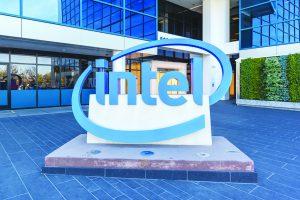BLOOMBERG
Intel Corp said it plans to invest $4.6 billion to build a semiconductor assembly and test facility in western Poland, its latest project in the European Union as the bloc seeks to boost chip production amid rising geopolitical tensions.
“With this investment today, and others in the EU, we’re excited to play a critical enabling point to building these more resilient supply chains,†Chief Executive Officer Pat Gelsinger said at a press conference announcing the plans in Wroclaw, Poland.
Earlier, a post on Polish Prime Minister Mateusz Morawiecki’s Twitter page said that 20 billion zloty ($4.9 billion) will be allocated by Intel to the project.
The facility marks Intel’s latest in the EU as the bloc’s relations with China deteriorate. Intel has an existing wafer fabrication facility in Ireland and plans to build a major chip complex in eastern Germany, as it seeks to create an end-to-end semiconductor manufacturing value chain in Europe.
“We have to get through EU approvals, but if I would have my crystal ball then sometime in 2027,†Intel Chief Global Operating Officer Keyvan Esfarjani said in an interview, referring to a tentative start date for the Polish plant. “This factory is critically needed.â€
Morawiecki, who attended the ceremony, said the Intel plant will be a “magnet†for further tech investment in Poland and will strengthen the country’s ties with the US.
He called it the biggest greenfield investment in the country ever.
Wafer fabrication facilities, or fabs, create chips on silicon wafers through chemical, mechanical and optical processes. Assembly and test facilities, such as the one planned in Poland, receive completed wafers from fabs, cut them into individual chips, assemble them into final products and test them for performance and quality.
The announcement comes as the German government is prepared to increase subsidies for the planned plant there to about €10 billion ($10.9 billion), Bloomberg reported, citing people familiar with the negotiations.
The projected cost of that complex has swelled from €17 billion to €30 billion, they said.
 The Gulf Time Newspaper One of the finest business newspapers in the UAE brought to you by our professional writers and editors.
The Gulf Time Newspaper One of the finest business newspapers in the UAE brought to you by our professional writers and editors.
